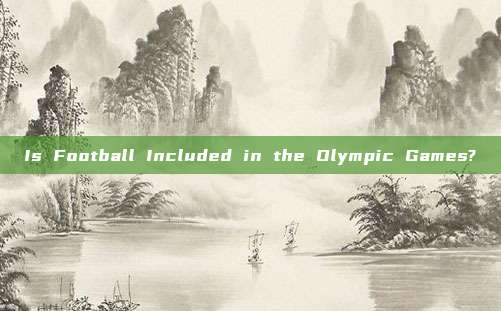**Is Football Included in the Olympic Games?**

---
**Introduction: The Beautiful Game and the Olympic Spirit**
In a world saturated with sporting events, one competition stands above all others—the Olympic Games. A celebration of human achievement and athletic prowess, the Olympics have been a beacon of unity and inspiration for over a century. Among the many sports that vie for the spotlight during this prestigious event, football (known as soccer in some regions) has a unique and storified history. This report delves into the intricate relationship between football and the Olympics, exploring the sport’s journey from its early appearances to its current status.
---
**The Origins: A Journey Through Time**

Football’s inclusion in the Olympic Games can be traced back to the early 20th century. The sport made its debut at the 1900 Paris Olympics, albeit in a somewhat informal manner. It was not until the 1908 London Olympics that football was officially recognized as an Olympic sport, marking the beginning of a long and evolving relationship.
---
**Evolution and Format Changes**
Over the years, the format of Olympic football has undergone significant changes, reflecting the shifting dynamics of international football and the Olympic movement itself. Initially, professional players were allowed to compete, but by the 1930s, concerns about professionalism led to restrictions. In 1984, the International Olympic Committee (IOC) introduced a rule allowing only under-23 players, with the exception of three over-age players per team, to participate in the men’s tournament. This move aimed to balance competitiveness with the opportunity for young talent to shine on the global stage.
---
**The Women’s Tournament: A New Era**
The inclusion of women’s football in the Olympics marked a pivotal moment in the evolution of the sport. The women’s tournament made its debut in 1996, offering female athletes a platform to showcase their skills on an equal footing with their male counterparts. Since then, the women’s tournament has grown in popularity and prestige, attracting top teams and becoming a highlight of the Olympic Games.

---
**Challenges and Controversies**
Despite its enduring presence in the Olympics, football has faced its share of challenges and controversies. One recurring issue is the scheduling conflict with club seasons. Many top players are contracted to major clubs, which often clash with the timing of the Olympics. This has led to debates over player release and the impact on national teams’ performances.
Another challenge is the debate over the age limit. While the under-23 rule has been in place since 1984, there have been calls to reconsider this policy. Some argue that it limits the participation of the sport’s biggest stars, potentially diminishing the tournament’s appeal.
---
**Impact on National Teams and Players**
For national teams, the Olympics serve as a crucial platform for developing young talent and fostering team cohesion. Winning an Olympic medal is a significant achievement, often elevating a nation’s status in the footballing world. For players, the exposure gained through the Olympics can be career-defining, opening doors to lucrative club contracts and international recognition.
---
**The Role of FIFA**
The International Federation of Association Football (FIFA), the governing body of football, plays a crucial role in shaping the sport’s presence in the Olympics. FIFA collaborates closely with the IOC to ensure the smooth running of the tournaments, while also addressing issues such as scheduling conflicts and player eligibility.
---
**The Future: Innovations and Opportunities**
Looking ahead, the future of football in the Olympics seems bright. Innovations in technology and media coverage are likely to enhance the viewing experience for fans around the world. Additionally, the ongoing efforts to promote gender equality in sports suggest that the women’s tournament will continue to grow in prominence.
---
**Conclusion: The Eternal Dance of Football and the Olympics**
As we reflect on the journey of football within the Olympic Games, it becomes clear that the sport’s inclusion is more than just a series of matches—it is a testament to the enduring spirit of competition and camaraderie. Whether through the triumphs of national teams or the individual stories of athletes, football remains an integral part of the Olympic narrative, capturing the hearts and imaginations of millions across the globe.
---
**Epilogue: Beyond the Field**
Beyond the field, the Olympic Games serve as a powerful symbol of unity and diversity. Football, with its universal appeal, plays a vital role in bridging cultural divides and fostering a sense of global community. As we look to the future, the eternal dance between football and the Olympics continues, promising more thrilling moments and unforgettable memories for generations to come.
---
This in-depth exploration of football’s place within the Olympic Games highlights the rich history, challenges, and opportunities that define this unique partnership. From its humble beginnings to its current status as a cornerstone of the Olympic movement, football’s story is one of evolution, resilience, and the unifying power of sport.





